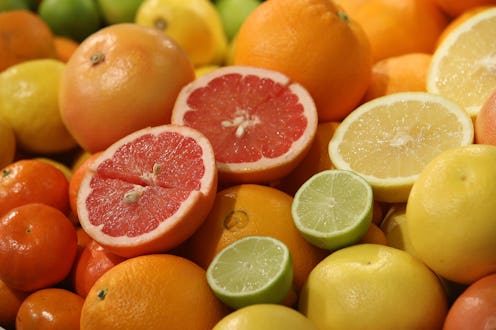Life
5 Weird Remedies For Constipation That Actually Work

Constipation, or difficulty passing a bowel movement, can strike for a number of reasons: new medication, dehydration, a lack of fiber in your diet, irritable bowel syndrome, or just your digestive system reacting poorly to something you ate. Annoyed by feeling like you can't pass anything through your system? These five ways to get rid of constipation may sound weird as heck, but they actually work.
Most of us know the old-school, reliable ways to cure constipation, including ingesting more fiber, rehydrating as much as possible, and taking laxatives if directed to do so by a doctor; but there are other methods that might be able to help, too.
Women happen to be more prone to constipation, and the hormone release we experience during periods can cause constipation on the regular. Constipation can be chronic, lasting for several weeks at a time, but you're generally considered to be constipated if you have fewer than three bowel movements per week. And it can be uncomfortable and painful, particularly as stools dry out as they lie in your colon, and can be hard and lumpy when you finally get rid of them. If you're seriously constipated, or keep experiencing constipation regularly, you can see a GP to sort out what might be happening. Before reaching for the laxatives, here are a few more off-the-wall, but nevertheless effective treatments that might solve your constipation issues.
1Do Self-Acupressure
This is going to sound slightly peculiar, but the application of pressure on the perineum — the stretch of skin between the genitals and the anus — whenever you feel the urge to have a bowel movement has been shown to be effective in relieving constipation. That's the conclusion of a 2014 study published in the Journal of General Internal Medicine that asked constipated patients to try the method; 72% of them reported relief from their constipation symptoms, and 82% said they'd keep using it to help their issues. The pressure appears to help the colon pass the stool through, so it might be a good thing to practice.
2Consume Pectin-Rich Foods
Pectin is mostly known as the substance that helps fruit jams thicken; it's found in high quantities in lots of fruits. And it turns out it can help relieve and prevent constipation, too. Healthline reports that pectin-rich foods like apples, citrus fruits, and sweet potatoes have been shown to help moisten stool in the colon, making it easier to pass. Apples, all types of berries, peaches, grapes, and apricots also contain pectin.
3Ask Your Doctor About Peppermint Oil Tablets
Constipation, both chronic and occasional, is a common symptom of irritable bowel syndrome, and peppermint oil capsules have been shown to be helpful in treating IBS patients who can't pass stools. A 2016 study showed that it helped IBS patients with multiple symptoms, including constipation. It's not yet quite clear why it works. However, it's hypothesized that the menthol in peppermint oil capsules cools the digestive system and relaxes colon muscles. If you have IBS this may be something to talk about with your doctor; if you have serious constipation that isn't IBS-related, it may not be right for you.
4Try A Bulking Agents
Did you know that an entire class of laxatives are known as "bulking agents" because they add volume and softness to stools, making them easier to push out? It's true — and you don't actually have to get laxatives themselves to consume them. Bulking agents come in two types: soluble fibers, like psyllium, and insoluble fibers, like wheat bran. They're easily available at the supermarket or health food store, and getting a greater dose of them in your diet is pretty easy; whole wheat bran muffins are delicious.
5Try Probiotic Foods
Yogurts, pickles, and other foods that contain probiotics, or populations of living bacteria, may or may not be universally good for the gut — but they do seem to help people with constipation. Research published in 2011 found that probiotics helped people with constipation across two different studies, and scientists at King's College London concluded in 2014 that over a dozen studies support probiotics as a constipation cure. Verdict: break out the kombucha.
6
If you're experiencing severe constipation, your doctor can help you figure out the issue, as a lack of bowel movements can be tough on your digestive system. Keep hydrated, up your fiber intake, and consider these slightly off-the-beaten-track methods to get yourself regular again.
This article was originally published on